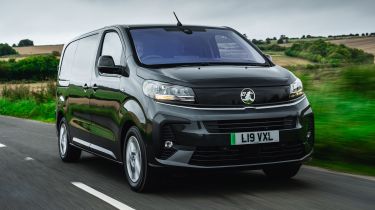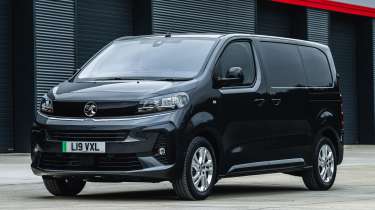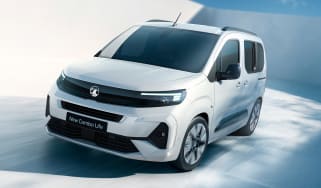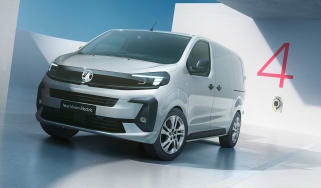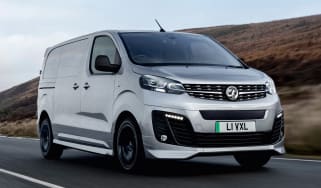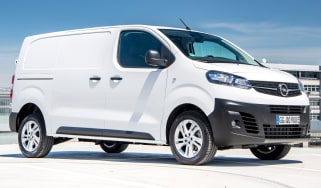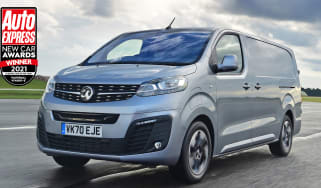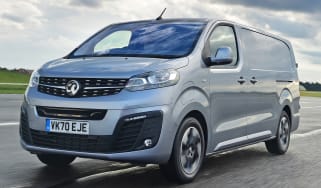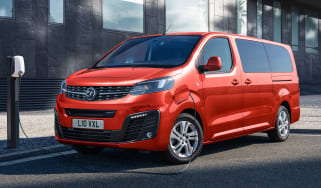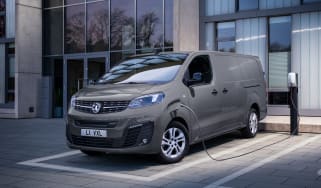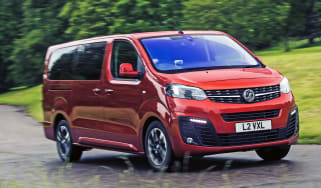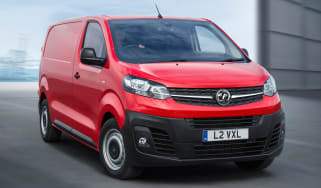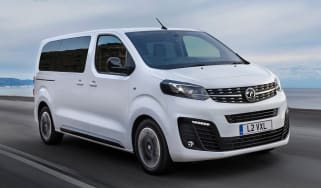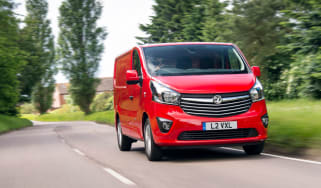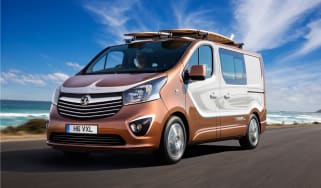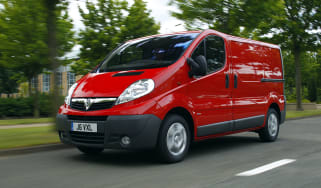Vauxhall Vivaro van review
The Vauxhall Vivaro van now falls under the Stellantis group umbrella, and is more car-like than ever to drive
Our opinion on the Vauxhall Vivaro
The medium-sized Vauxhall Vivaro van has been part of the Vauxhall van line-up since the early 2000s. It has been a popular choice for buyers, especially because it's one of the few vehicles still ‘Made in Britain’: a fact that Vauxhall is proud to promote using badges on the back doors.
Overall, the Vauxhall Vivaro offers a user-friendly package that should appeal to medium-sized van buyers who want something that's car-like to drive. The third-generation model launched in 2019 was given a radical revamp versus its predecessor, and now benefits from the engineering might of the Stellantis Group. A facelift in 2024 gave the vehicle a new look and some fresh tech inside.
It could be available with more competitive finance deals than its Peugeot, Citroen, Fiat and Toyota counterparts, and it’s certainly worth a place on any mid-size panel van buyer's shortlist.
About the Vauxhall Vivaro
Until the current generation arrived in 2019, the Vauxhall Vivaro was a member of a joint-venture family that included the Renault Trafic, Nissan NV300 and Fiat Talento mid-size vans.
That all changed after the PSA Group (now Stellantis) bought Vauxhall in 2017, and the third-generation Vivaro for sale today shares its engineering and most of its design with a new family of vans. This group of identikit models includes the Citroen Dispatch, Peugeot Expert, Fiat Scudo and the Toyota Proace.
Used - available now

2024 Cupra
Formentor
44,913 milesAutomaticPetrol1.5L
Cash £20,497
2023 Vauxhall
Corsa
7,795 milesManualPetrol1.2L
Cash £14,697
2022 Ford
Fiesta
28,320 milesAutomaticPetrol1.0L
Cash £14,397
2018 Nissan
Micra
20,600 milesManualPetrol0.9L
Cash £8,876These may be stablemates of a sort, but they all provide stiff competition for the Vivaro, which must also do battle with the new generation of its erstwhile cousins mentioned above. As well as these rivals, the Vivaro has the front-running Ford Transit Custom and all-new Volkswagen Transporter to contend with, so while a mid-life update in 2024 helped freshen things up, it certainly hasn’t got an easy life convincing buyers who are spoiled for choice.
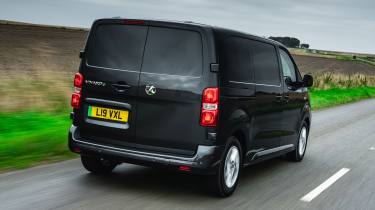
Overall, the third-generation Vivaro is shorter and narrower than the old model, meaning there's slightly less width between the wheelarches. But load volumes are slightly bigger than before, thanks to a slightly higher roof and less intrusion from said wheelarches. Vauxhall also offers a through-load facility for the standard-fit steel bulkhead that allows you to load long, narrow items all the way into the passenger side footwell. Payloads are improved, too.
The Vivaro is built in two lengths, standard and XL, although unlike the old Vivaro, the XL's extra length is behind the rear axle, so both versions have the same wheelbase. The Vivaro is no longer available with a high-roof option, but the five-seater Vivaro Double cab continues. This has a second row of seats and it's available in the same standard and XL lengths as the panel van.
Powertrain options have been slimmed down since the 2024 facelift, but there’s still a choice of diesel or electric – the former with a choice of manual or automatic gearboxes. If you do most of your work around town or cover lower mileages, the Vivaro Electric might be of interest; it’s more expensive than the diesel, but with a big 75kWh battery, its 219-mile range is competitive – and you’ve the potential to save a fortune if you can charge overnight.
While there used to be no fewer than five diesel options, this has been reduced to just two more recently: a 1.5 Turbo D with 118bhp (120PS) or a 2.0-litre Turbo D with 143bhp (145PS). Both get a six-speed manual gearbox as standard, while an auto is a circa-£1,800 option on the higher-power van. There’s also a limited-edition GS model with a 178bhp diesel engine, but it’s expensive. All vans get a 70-litre fuel tank, while a 22.5-litre AdBlue tank will need filling every few thousand miles.
The Vivaro model line-up now consists of two trim grades plus the limited GS, which gets just about everything you could want plus a sporty bodykit. Prime is the more basic of the two main mainstream trims but you still get kit such as cruise control and rear parking sensors, plus a 10-inch touchscreen with Apple and Android connectivity and a fully-digital instrument cluster. It’s pretty comfortable too, thanks to driver’s seat lumbar support, air-con, and electric windows.
Above this sits the Vivaro Pro, with LED lights, different fabrics, plus the City Pack as standard. That City Pack includes a ‘Dynamic Surround View’ monitor with cameras that really help with parking and manoeuvering.
MPG and running costs

| Pros | Cons |
|
|
The Vivaro's switch to PSA-developed (now Stellantis) engines is a boost for fuel economy as well as performance. The two engines offered are 1.5 and 2.0-litre Turbo D diesels, while the Vivaro Electric (previously Vivaro-e) offers the potential for super-low running costs.
The 1.5 Turbo D now comes only in 120PS (118bhp) form, since the 100PS (99bhp) version was dropped with the facelift. The 2.0 Turbo D is more powerful, boasting 145PS (143bhp) and the option of an auto gearbox.
Under the latest WLTP tests, the best-performing engine in the range for economy is the 1.5 120PS, which returns 44.8mpg on the combined test cycle. The 2.0-litre version isn't far behind at 38.7mpg – so if you regularly carry heavier loads, this could be a smart choice. For reference, the automatic transmission actually improves efficiency slightly, with this version returning up to 39.8mpg on the combined cycle.
All Vivaros come with a 70-litre fuel tank, so you could theoretically travel more than 600 miles in any version on a single fill. There's also a 22.5-litre AdBlue tank that will need filling every few thousand miles. This is critical to controlling the van's emissions, and the trip computer will let you know when it needs doing – ignore it and eventually the van won't start.
Service intervals for the Vivaro depend on which engine you choose. Go for the Vivaro Electric or the 1.5 Turbo D, and you'll need to visit your Vauxhall Business Centre every two years or 25,000 miles, whichever comes first. The 2.0 Turbo D models also have a two-year service interval, but the mileage limit is raised to 30,000 miles.
Electric range, battery life and charge time
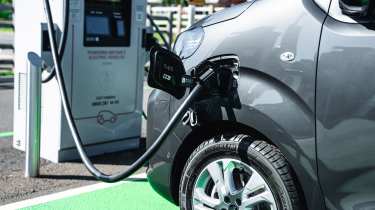
The Vivaro Electric has fewer moving parts and should be easier to maintain – if the electric range works for you. Previously, a 50kWh battery was offered, but that’s been dropped now and is no longer available. The remaining model has a range of up to 219 miles, or slightly less if you go for the longer XL model.
Charging at a 100kW rapid charger will take around 45 minutes for a five to 80 per cent charge. 11kW home charging is available as an optional extra but most will use the on-board overnight 7.4kW charge speed as this is what most homes and businesses in the UK have available.
Load space and practicality
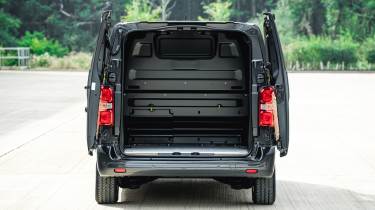
| Pros | Cons |
|
|
Most vans evolve from one model to the next, but with a wholesale switch in platform and running gear for the Vauxhall Vivaro when the current iteration launched in 2019, there are drastic changes to the panel van's cargo area.
There are still standard and XL lengths, but while the last Vivaro had a longer wheelbase to increase cargo volume, the Vivaro Mk3 has extended bodywork behind the rear axle. At 4,959mm, the Vivaro standard is 39mm shorter than before, while the XL is 89mm shorter, at 5,309mm. That means the XL is 350mm longer than the standard, compared to a 400mm difference between the old Vivaro standard and XL.
Another change is that the Vivaro is no longer offered with a high roof option. The standard van is slightly taller than before, but that's no compensation for buyers wanting significant extra height - they'll need to look elsewhere, at the Ford Transit Custom, for example, or the Renault Trafic, if they liked the old Vivaro's dimensions. The larger Movano is the only option within Vauxhall's van range if you need the extra space.
The Vivaro Mk3 is shorter and narrower than the Mk2, but most of the loss in length is found at the front, with a shorter bonnet before you get to the cab. The load area is a little shorter (2,512mm for the standard, 2,862mm for the XL, compared to 2,537mm and 2,937mm for the old Vivaro), and there's less width between the wheelarches, although it's only shrunk by a centimetre to 1.26 metres.
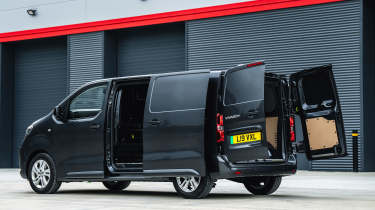
What the Vivaro has gained is a taller load area, with a maximum height of 1,397mm from floor to ceiling. That's a centimetre more than before, and when combined with less wheelarch intrusion into the load area, cargo capacity is slightly larger than the last Vivaro. That means a minimum load volume of 5.3 cubic metres for the standard, and 6.1 cubic metres for the XL. This expands to 5.8 and 6.6 cubic metres when the through-load facility is used, but this only applies to loads that can fit through the hole in the bulkhead, which will be planks, ladders, tubing or pipework.
In comparison, the Ford Transit Custom has up to 5.8 cubic metres of space without adding a through-load option, and there's the XL variant that extends this figure to 6.8 cubic metres. Add the high-roof (not available on the Vivaro) and the number for even the standard jumps to 7.7 cubic metres, or 9.0 cubic metres on the longer van.
There's a broader spread of payload weights than before for the Vivaro. The least powerful 1.5 diesel manages 1,182kg, while the 2.0-litre bumps this to 1,384kg. The auto is slightly down on the manual, with a 1,349kg maximum. The Vivaro Electric, meanwhile, is limited to 1,001kg.
While load volumes and payload weights are good, access to the Vivaro's load space is a bit of a sticking point. The van's exterior design means the rear isn't as upright and square as before, and the back door openings are 100mm shorter at 1,220mm, while the overall width of the rear opening is down by 109mm to 1,282mm. The side doors are slightly less tall at 1,241mm, but are a significant 95mm narrower than before, at 935mm. This might be a major sticking point for potential buyers, although at least twin side doors are standard across the range.
Reliability, safety and security
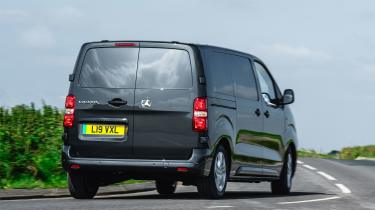
| Pros | Cons |
|
|
The switch to Stellantis running gear means the Vauxhall Vivaro is now one of the safest medium-sized vans for sale. It sources electronics from the company’s EMP2 platform found under cars such as the Citroen C5 Aircross and previous generation Vauxhall Grandland, so it comes fitted with advanced safety kit such as lane departure warning, adaptive cruise control and autonomous emergency braking.
One issue we do have with the Vivaro is the lack of wide-angle mirrors. The old van used to have a second smaller mirror below the main door mirror to boost rear visibility, but that's no longer the case. The Dynamic Surround View with Connected Navi Pack adds blind-spot assist, plus a load of cameras and all-round parking sensors, but it’s a £1,250 option on base models.
In the unfortunate event that you do have an accident, the Vivaro's crash structure earned a gold Euro NCAP rating when it was tested in 2024.
And the good news continues in terms of the latest Vivaro's reliability. Again, its use of Stellantis Group running gear means that while it was only recently updated, all of its running gear and components are tried and tested on a variety of passenger cars and commercial vehicles. For example, the body, chassis, suspension, engines and electronics are all shared with the Citroen Dispatch and Peugeot Expert, and these two models have been for sale in the UK since 2016 without much issue.
The parts sharing continues with the Vivaro Electric. As well as electric Dispatch and Expert variants, the three vans share running gear with other electric models within the Stellantis Group of brands.
Driving and performance
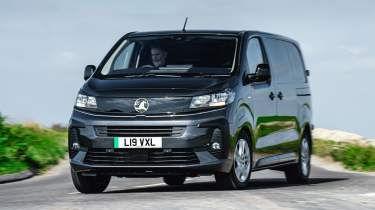
| Pros | Cons |
|
|
There's a choice of 1.5 or 2.0-litre diesels, and unless you don't carry many weighty items in the back of your van, we'd recommend the 2.0-litre over the 1.5. The lower-capacity unit is good for economy, but you'll have to work it harder with a heavy load on board, which will cancel out any fuel saving benefits it might provide.
The 2.0 is now only available with 143bhp – but this covers most bases and in our experience didn’t seem to suffer with a full load in the back. Our version had the standard-fit six-speed manual gearbox, which has a relatively short first gear but can get bogged down if you’re not prepared to cycle through the cogs when pulling out for an overtake, for example. If you're doing big mileages, and can afford the extra, we'd choose the eight-speed auto. It's a smooth gearbox that takes the strain out of driving.
The Vivaro has a slightly lower driving position than before, while the van's responses are more car-like. The steering reacts quickly to inputs, and with a lower centre of gravity it feels more nimble when unladen. A Ford Transit Custom is still more fun, if flinging your company van around is a priority.
Of course, the Vauxhall’s suspension is designed with heavy payloads in mind, and there's good stability with a half-load on board. When unladen, there's some suspension bounce, but it's not as harsh as some rival vans in the class.
Town driving, visibility and parking
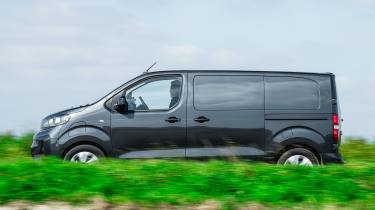
The Vivaro Electric (previously Vivaro-e) offers an instant hit of EV acceleration, but this soon tails off the faster you go. Though you’ll want to keep your speed to a minimum – as that brick-like shape will chew through any remaining range if you spend too much time on the motorway. Generally, the Vivaro feels manoeuvrable and compact in tight streets but visibility could be better.
Motorway driving and long-distance comfort
Refinement is good, and the Vivaro is relatively quiet at higher speeds – especially if you’ve got a load out back softening some of the road noise penetrating the bulkhead. We just wish the door mirrors were larger so you could have a better feel for your surroundings.
Cab interior and technology
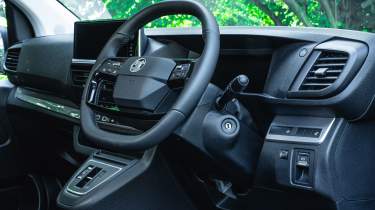
| Pros | Cons |
|
|
If you're trading in your old Vauxhall Vivaro for the current one, you'll immediately notice the lower seating position from behind the wheel. Thanks to its new running gear, the driving position is very car-like. It's still taller than most SUVs, but doesn't quite have the same commanding position that the old Vivaro did.
However, there's plenty of seat and wheel adjustment, so it's easy to get comfortable, and the seats themselves are reasonably supportive. Standard-fit lumbar support helps, although they might feel a little soft for some. One niggle is that while the driver gets a left armrest, there isn't one on the right – so you’re forced to lean into the centre of the van to get comfortable, or rest your arm on the window ledge, which feels a little high.
The seats themselves are trimmed in easy-clean fabric, while all vans get a pair of passenger seats. However, if you are regularly travelling three-up, you might want to look elsewhere, because the Vivaro isn't the most comfortable three-seat van on the market – especially if you go for the manual gearbox, which will have you regularly brushing your companion’s knee.
Build quality is fine rather than particularly premium, with hard wearing plastics that feel robust and solid, while storage is useful, too. The middle seat has a section that folds to create a table, while the seat bases open to reveal under-floor storage, although this is also where loads come through if you're using the hatch in the bulkhead. The glovebox is on the small side, courtesy of the position of the fuse box next to it, but there's dashtop storage and deep door bins, plus individual cupholders on either side of the dash.
Infotainment, sat-nav and stereo
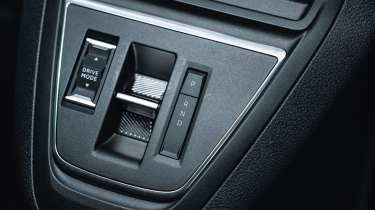
The Vivaro's dashboard is identical to the one you'll find in the Citroen Dispatch or Peugeot Expert, with facelifted versions getting a pair of bright, clear digital displays. Most functions are on the central touchscreen, although the climate controls are separate, which we like. Apple CarPlay and Android Auto make pairing your phone nice and easy, and you can run maps and media seamlessly just as you would in most modern cars.
Buying and owning
If you do a lot of local trips around town, especially in London’s low emissions zone, then the Vivaro Electric will be the best option. Despite costing more initially, it could save you a lot of money in tolls and fuel in the long run.
However, the diesel options will be a better bet for businesses that expect the van to be used on the motorway regularly. You’ll see about 40mpg from any of the diesel options here, and the automatic gearbox actually helps with economy rather than hindering it. It’s a smooth box so we’d recommend it if you expect traffic when using the Vivaro.
Alternatives
The Fiat Scudo, Citroen Dispatch, Peugeot Expert and Toyota Proace are all pretty much the same van as the Vivaro. The main differences are what’s available - the Fiat has a 50kWh battery option at the time of writing, while the Toyota has a better warranty, for example. Other than that, they offer the same strengths and weaknesses, so choose the one that is the best value for you.
You might consider a Volkswagen ID. Buzz Cargo if you’re going electric, or a VW Transporter if you’re sticking with diesel. There’s also the Ford Transit Custom, which is excellent and well worth a look. The Renault Trafic and Nissan Primastar are based on the same platform, and there’s also the Mercedes Vito in this class, so there’s plenty of choice here.
Vauxhall Vivaro pictures
Van dimensions | |||
| Body style | Height | Width (with mirrors) | Length |
| Vivaro (& Doublecab) | 1,904mm | 2,204mm | 4,981mm |
| Vivaro XL (& Doublecab) | 1,935mm | 2,204mm | 5,331mm |
Load area dimensions | ||||
| Body style | Height | Width | Length | Volume |
| Vivaro (w/bulkhead option) | 1,397mm | 1,636mm | 2,512mm (3,674mm) | 5.3m3 (5.8m3) |
| Vivaro XL (w/bulkhead option) | 1,397mm | 1,636mm | 2,862mm (4,024mm) | 6.1m3 (6.6m3) |
| Vivaro Doublecab | 1,397mm | 1,636mm | 2,017mm | 3.2m3 |
| Vivaro Doublecab XL | 1,397mm | 1,636mm | 2,365mm | 4.0m3 |
Frequently Asked Questions
Yes, the Vivaro is a great option for those looking for a good-value medium van with a lot of equipment and a comfortable ride. It’s not as good in some key areas as a Ford Transit Custom, but depending on your needs it could be nearly as good and cheaper, so well worth considering.

